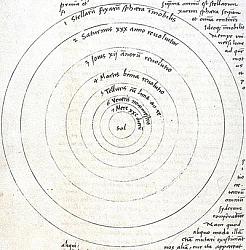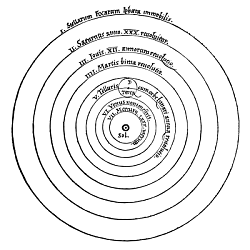Actually, I'm not so sure that Copernicus knew only Roman numerals. Two figures from the Wikipedia article on the man here...
This figure from a surviving AUTOGRAPH copy of De Revolutionibus...
shows him using Arabic numerals
which were converted to Roman in the published version...
Copernicus lived 1473-1543. As this extract from Wikipedia...
The reception of Arabic numerals in the West was gradual and lukewarm, as other numeral systems circulated in addition to the older Roman numbers. As a discipline, the first to adopt Arabic numerals as part of their own writings were astronomers and astrologists, evidenced from manuscripts surviving from mid-12th century Bavaria. Reinher of Paderborn (1140 - 1190) used the numerals in his calendrical tables to calculate the dates of Easter more easily in his text Compotus emendatus.
shows, Arabic numerals were already well known and in use during Copernicus' life. Given that he was a polymath, he would have been well aware of the simplicity afforded by the decimal system expressed with Arabic numerals.
As soon as one starts using an abacus, with its neat columns representing powers of ten, one is already driven to a positional number representation. The only thing missing is separate symbols for the digits zero to nine. The Arabic numerals provided just that.
Although the positional number system had spread from Arabia to Europe at the beginning of the second millennium (hundreds of years before Copernicus' birth), I believe that the use of abacus-like devices provided a lot of encouragement to its wide-spread adoption.


 LinkBack URL
LinkBack URL About LinkBacks
About LinkBacks




 Reply With Quote
Reply With Quote

Bookmarks